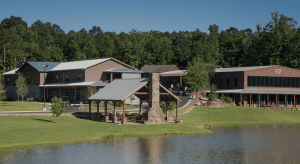The Ripple Effect: Addiction’s Growing Impact
Have you ever spent time in nature, close to a body of water, smooth and clear, and had an overwhelming desire to skip some stones across the mirrored surface? In the many years of studies, by children and adults alike, when skipping rocks across a body of water, the smoothest stones are the best. Those rubbed shiny and almost flat from years of water and environment rushing over are a coveted waterfront find. They feel cool and safe in the palm of your hand – not at all harmful to you or anyone else, especially not that water.
To get the perfect skip, research would say you have to look out on the clear, glassy water and release – it’s all in the flip of the wrist. The measure of skill doesn’t just happen overnight. It takes years of stone skipping practice.
It’s much the same when one finds oneself entrenched in the world of addiction. Those struggling with addiction never go into it looking for trouble. Often the source of the addiction seems a safe place, a prescription or perhaps a friend. And yet, once those “stones” hit the water, trying to stop or even control the ripples that will inevitably come afterward can be near impossible.
The ripple effect of addiction has several layers of impact. Each dynamic claiming more and more unwelcome territory in life than the first.
The Ripple of Self
Most individuals who pick up a substance for the first, second or even third time still have no intention of becoming addicted. Many even think that they are physically more powerful than the drug. They live under the misconception that they control the drug – it doesn’t control them. Plus, it’s not hurting anyone, so why not give in a little more each time – deepen the ripple – if it eases the pain, just for a moment?
The problem with this philosophy is rooted in the disease of the science of addiction itself. Many people don’t understand why or how other people become addicted to drugs. A common mistaken thought is that those who use drugs simply lack a solid moral compass and that they could stop their substance use merely by choice. In reality, drug addiction is a complex disease, and the answer is rarely ever just “good intentions” or a “strong will’ by themselves. Drugs have the ability to rewire a brain, making it difficult to “just quit” no matter your mental fortitude.
The National Institute on Drug Abuse defines addiction as “…a chronic disease characterized by drug seeking and use that is compulsive, or difficult to control, despite harmful consequences. The initial decision to take drugs is voluntary for most people, but repeated drug use can lead to brain changes that challenge an addicted person’s self-control and interfere with their ability to resist intense urges to take drugs. These brain changes can be persistent, which is why drug addiction is considered a “relapsing” disease—people in recovery from drug use disorders are at increased risk for returning to drug use even after years of not taking the drug…”
The Ripple of Loved Ones
The ripples don’t just stop in the water once the stone is tossed. One of the first areas to be impacted by addiction, outside of self, is relationships – those who surround you, who know you best (sometimes better than yourself), the family and the friends who love you as family. These are the eyes and ears that most often recognize that something is not alright in the world. They often are the first to sense that something is out of balance, and the most difficult realization is that they cannot make this better for the person they love. In their human strength, they cannot craft a cure, cannot heal the pain, and so often, this ripple tends to become the enablers. Loved ones fuel this ripple through covering for the addict, making excuses, taking on more of the shared responsibilities – even to the point of raising children – or worse, funding the addiction for the addict, so they won’t seek it out through more harmful and dangerous means.
The Ripple of Recognition and Consequence
As it happens in water, once the ripples begin to be cast further and further, they grow larger in reach and radius. When battling addiction, one may think it’s a private battle, but left unchecked and enabled by a loved one, these ripples have the potential to send your future on a collision course, often from no return. Jobs may be at stake, finances struggle, legal frustrations can begin to mount – poor decisions made while under the influence of substances now begin to take a toll on the day to day life. Secrets are not as easily hidden under great makeup, strong cologne or a quick swish of the mouthwash. This ripple becomes more widespread as it takes your private addiction battle public.
It’s obvious that these ripples could cascade forever – soon touching layers of civic responsibility, personal finances, loss of freedoms and possessions all triggered by an addiction you thought you had control of. You may find yourself reeling, asking “How did this happen? Wasn’t I the one who “threw the stone” to begin with? Why can’t I make it stop?”
The secret is simple, yet the solution is rooted in complexity. To make the ripples stop in water, you must stop tossing the stones. To make addiction stop in life, you must stop using and detox. As mentioned before, however, just stopping isn’t always a choice everyone can easily make. Once addiction has touched your life, it’s impact may need some additional support to fully stop altogether.
Treatment at Oxford
That’s where treatment comes in. Once you add the treatment “stone” into the mix, the ripples begin to change. It starts with the ripple of self, but begins to blossom into the ripples of healing, of renewed relationships, of forgiveness and recovery – of a new chance to make a better and deeper impact, both in your own life and in the lives of those who love you.
Change the course of your impact. Course correct your ripple effect. Contact us today to begin your journey of treatment, recovery and healing.
_____
Read More from Lindsey Simpkins:
American Addiction Centers (AAC) is committed to delivering original, truthful, accurate, unbiased, and medically current information. We strive to create content that is clear, concise, and easy to understand.
While we are unable to respond to your feedback directly, we'll use this information to improve our online help.